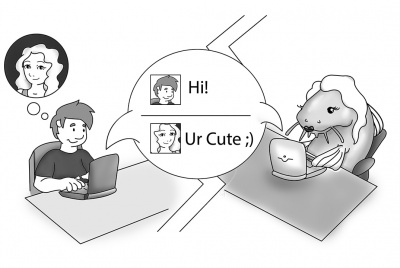Difference between revisions of "Online Dating - Catfishing Edition"
| Line 13: | Line 13: | ||
[[File:Catfish-tvshow.png|400px|thumbnail|right|Catfish: TV Show started in 2012 <ref>Buckman,C.(2018, January 22)."'Catfish: The TV Show' makes casting stop at SDSU".''The Daily Aztec''.https://thedailyaztec.com/87229/artsandculture/catfish-the-tv-show-makes-casting-stop-at-sdsu/#</ref>]] | [[File:Catfish-tvshow.png|400px|thumbnail|right|Catfish: TV Show started in 2012 <ref>Buckman,C.(2018, January 22)."'Catfish: The TV Show' makes casting stop at SDSU".''The Daily Aztec''.https://thedailyaztec.com/87229/artsandculture/catfish-the-tv-show-makes-casting-stop-at-sdsu/#</ref>]] | ||
| − | == [https://en.wikipedia.org/wiki/Catfish:_The_TV_Show Catfish: The TV Show] == | + | ==In The Media== |
| + | === [https://en.wikipedia.org/wiki/Catfish:_The_TV_Show Catfish: The TV Show] === | ||
The 8 season show stemmed from the movie created by Nev Schulman about his experience with a woman, "Angela", who was falsifying her online identity and in fact, turned out to be a married woman. Schulman is credited for establishing the [https://www.youtube.com/watch?v=Z_9_WMc_WTI word] which he came up with after a conversation with "Angela" and her husband. The husband mentioned that codfish transported from Alaska to China would often arrive tasteless, so he used catfish to keep the fish nimble and arrive ready to eat. The catfish "keep you guessing, they keep you thinking, they keep you fresh. And I thank god for the catfish because we would be droll, boring and dull if we didn’t have somebody nipping at our fin.<ref>Harris,A.(2013, January 18)."Who Coined the Term “Catfish”?".''Slate''.https://slate.com/culture/2013/01/catfish-meaning-and-definition-term-for-online-hoaxes-has-a-surprisingly-long-history.html</ref>". | The 8 season show stemmed from the movie created by Nev Schulman about his experience with a woman, "Angela", who was falsifying her online identity and in fact, turned out to be a married woman. Schulman is credited for establishing the [https://www.youtube.com/watch?v=Z_9_WMc_WTI word] which he came up with after a conversation with "Angela" and her husband. The husband mentioned that codfish transported from Alaska to China would often arrive tasteless, so he used catfish to keep the fish nimble and arrive ready to eat. The catfish "keep you guessing, they keep you thinking, they keep you fresh. And I thank god for the catfish because we would be droll, boring and dull if we didn’t have somebody nipping at our fin.<ref>Harris,A.(2013, January 18)."Who Coined the Term “Catfish”?".''Slate''.https://slate.com/culture/2013/01/catfish-meaning-and-definition-term-for-online-hoaxes-has-a-surprisingly-long-history.html</ref>". | ||
| Line 27: | Line 28: | ||
===To Catch a Predator=== | ===To Catch a Predator=== | ||
| − | In 2004, NBC launched a new show | + | In 2004, NBC launched a new show [https://en.wikipedia.org/wiki/To_Catch_a_Predator To Catch a Predator], an American reality tv program hosted by Chris Hansen focused on catfishing predators into thinking they’re chatting with underage teen girls online. When a man and the assumed minor planned to meet up, a sting operation was revealed where the predator was ultimately arrested <ref>Hansen, Chris. (2006, September 13). They’re Still Showing Up. ‘’NBC News’’ https://www.nbcnews.com/id/wbna14824427</ref>. The show teamed with the Perverted Justice Foundation- an organization fighting to combat pedophilia via online chat rooms. Adult members often join chat rooms acting as minors and work with law enforcement to find pedophiles and bring them to justice <ref>Perverted Justice Foundation. Frequently Asked Questions. http://www.perverted-justice.com/index.php?pg=faq#cat1</ref>. |
== Types of Catfishers == | == Types of Catfishers == | ||
Within the realm of Catfishing, there are multiple different types of catfishes. Each one has different motives and agendas when they’re meeting an individual online. | Within the realm of Catfishing, there are multiple different types of catfishes. Each one has different motives and agendas when they’re meeting an individual online. | ||
Revision as of 17:27, 1 April 2021
Catfishing in mainstream media is known as an action performed by someone who utilizes another person’s online identity to target another individual usually causing harm or deception. There are various reasons why someone may be more inclined to use a false online identity include but are not limited to low self-esteem, depression or anxiety, seek revenge, monetary gain, exploring their sexuality, and seeking out revenge or harassment.[1] Catfishing has long been a part of society but the term wasn't coined until 2010 when Nev Schulman released a film, Catfish, about his experience being Catfished himself after having a relationship with a woman he met online only to discover that she was not the person she identified herself as. From then on, many people seemed to identify with the film because they had similar stories which caused Nev to create a TV Show to share those stories.
Catfishing can have a greater impact in certain communities more than others, whether this be in relation to race, gender, or sexual orientation. It additionally has higher raters within specific communities, in comparison to others.[2]

Contents
Demographics
As of 2021, Alaska has been identified as the number one state with the most Catfishing reports.[4] Right behind Alaska, Nevada, and Wisconsin (the most dangerous scamming state[5]) are also known catfishing hotspots. On the contrary, states with relatively few cases of catfishing include: Vermont, South Dakota, and Montana. Once people report these cases of being catfished where scams are involved, states calculate the amount lost and add those numbers up over the course of the year.
Branded, a data collection website did their own research on their community members to see who has catfished before. Their data suggested that 1 in 5 people out of 16,827 have impersonated someone else online to gain favor with others. [6] They also found that 25% of men pretended to be someone else versus 18% of the women who participated in the poll. Correspondingly, Branded also discovered data in relation to race and ethnicity such that about 28% of people who identify as Asian use a different social media identity than themselves. Trailing behind them is 23% for people who identify as Hispanic and 20% for people who identify as African American.[7]

In The Media
Catfish: The TV Show
The 8 season show stemmed from the movie created by Nev Schulman about his experience with a woman, "Angela", who was falsifying her online identity and in fact, turned out to be a married woman. Schulman is credited for establishing the word which he came up with after a conversation with "Angela" and her husband. The husband mentioned that codfish transported from Alaska to China would often arrive tasteless, so he used catfish to keep the fish nimble and arrive ready to eat. The catfish "keep you guessing, they keep you thinking, they keep you fresh. And I thank god for the catfish because we would be droll, boring and dull if we didn’t have somebody nipping at our fin.[9]".
Using this as inspiration, Schulman then started Catfish: The TV Show to share more stories of people who related to his situation. He and Max Joseph then co-hosted 7 seasons of Catfish with one another, traveling across the nation to find out if someone’s lover was really them or an impersonation of someone else. The show is currently on its 8th season with Schulman and now Kamie Crawford as co-host. [10]
Nev and his team would help individuals who think they're being Catfished but are unsure if it's true. Using his resources, Shulman would do research into the supposed person and work with the guest on the show to discover their true identity.
Catfishing on Dating/Networking Platforms
With the continuing rise of online dating and social networking platforms such as Tinder, Hinge, Bumble, and Grindr, catfishers are in a position to catfish more than ever before. The nature of these online platforms allows for virtually anybody to make an account and assume an identity that is not their own in order to make them more appealing for other users to interact with. Often, there are not sufficient safeguards put into place during the account creation process for these applications to ensure that someone is not engaging in catfishing and/or using someone else’s photos or other personal information. The account creation process is often as simple as entering an email address, a name, age, phone number, and from that point, the user is given the benefit of the doubt. [11]

An attempt at safeguarding against catfishing and spam on these social platforms includes Tinder’s Photo Verification feature, which was introduced at the beginning of 2020. The feature is opt-in, and the mechanism for it is that Tinder will prompt users to take a series of selfies in which the user will assume certain poses. Afterward, the selfies will be sent in for both a manual and automated review. Accounts passing this review will then be given a blue checkmark on their profile [13]. Bumble has a similar offering on its platform [14] [15] While there is no source that directly indicates just how much this feature has reduced catfishing, the feature allows for reasonable affirmation that someone on Tinder is who they claim to be.
To Catch a Predator
In 2004, NBC launched a new show To Catch a Predator, an American reality tv program hosted by Chris Hansen focused on catfishing predators into thinking they’re chatting with underage teen girls online. When a man and the assumed minor planned to meet up, a sting operation was revealed where the predator was ultimately arrested [16]. The show teamed with the Perverted Justice Foundation- an organization fighting to combat pedophilia via online chat rooms. Adult members often join chat rooms acting as minors and work with law enforcement to find pedophiles and bring them to justice [17].
Types of Catfishers
Within the realm of Catfishing, there are multiple different types of catfishes. Each one has different motives and agendas when they’re meeting an individual online.
Cyberbullies
People will create fake profiles online to share and spread information about a person they may or may not know. They aim to hurt, intimidate or harass the individual they’re targeting and it is often prevalent with teenagers or even adults[18]. Bullying has always been prevalent within society, but the introduction of technology has heightened and allowed bullying to occur on a larger scale. Depending on the crime, cyberbullies could face legal ramifications[19].
Revenge
Those who may be jealous or angry at another individual may use catfishing as a way to “get back” or “get revenge” from those who have wronged them. They often will create fake accounts and post pictures of the victim without their consent. This is typically done to harm the individual’s reputation or embarrass them. They can also use the accounts they create to lure and seduce their victim resulting in emotional harm [20].
Insecurities
Some individuals may not have confidence in themselves in real life and use the internet to gain the attention or recognition they may not receive. They may act like someone they wish to be instead of who they really are, in hopes of gaining connections and respect they may not have gotten if they were their true selves. In turn, this can help their self esteems and give them a glimpse into a life they want but may not have the ability to create [21].
Ethical Concerns
The many options of social media applications to engage in gives people a plethora of opportunities to interact with other people however they choose. This wide variety of social media applications allows for the possibility of one to interact with someone whose online presence is not their true self. In certain capacities, impersonating a professional can be illegal.[22]
Catfishing is an activity that often exploits other people’s anxieties, self-confidence (or lack thereof), as well as optimism in looking for a partner or friend [23]. Notably, in early-mid 2020 as travel and gathering restrictions were enacted due to the ongoing COVID-19 pandemic, attention was once again brought to catfishing [24]. Due to the largely remote nature of most interactions during the pandemic due to social distancing, potential catfishers were less deterred by the prospect of eventually having to meet with someone they were communicating with [24]. That, in addition to the added stressors of life due to quarantine/isolation anxieties as well as fears of catching the virus, people could generally be in a state that is more susceptible to being a target of catfishing [24]. According to a poll by the American Psychiatric Association released in October 2020, 62% of Americans reported feeling anxious, a roughly 30% uptick from the same poll at the same time last year [25].
See Also
References
- ↑ Brennan MD,D.(2020, December 03)."Signs of Catfishing". WebMD.https://www.webmd.com/sex-relationships/signs-catfishing
- ↑ (2017, January 10)."Abuse Using Technology". Women's Law.https://www.womenslaw.org/about-abuse/forms-abuse/technology-abuse/technology-tool-abuse/impersonation
- ↑ Craddock,B.(2013, February 08)."Something's Fishy: Safety concerns come hand-in-hand with online dating".The Flare Online.https://theflareonline.com/2013/02/somethings-fishy-safety-concerns-come-hand-in-hand-with-online-dating/
- ↑ Grant,A."States with the Highest Catfishing Rates". https://bestvpn.org/catfishing-statistics/
- ↑ Nyman,S.(2019, June 06)."Suckers for love? Report shows Wisconsin among top states for romance scams".Post Crescent.https://www.postcrescent.com/story/life/2019/06/06/catfishing-statistics-wisconsin-ranks-no-3-romance-scams/1365159001/
- ↑ Miles,K.(2019, May 15)."Men Are More Likely Than Women To Catfish".Branded.https://gobranded.com/men-likely-women-catfish
- ↑ Miles,K.(2019, May 15)."Men Are More Likely Than Women To Catfish".Branded.https://gobranded.com/men-likely-women-catfish
- ↑ Buckman,C.(2018, January 22)."'Catfish: The TV Show' makes casting stop at SDSU".The Daily Aztec.https://thedailyaztec.com/87229/artsandculture/catfish-the-tv-show-makes-casting-stop-at-sdsu/#
- ↑ Harris,A.(2013, January 18)."Who Coined the Term “Catfish”?".Slate.https://slate.com/culture/2013/01/catfish-meaning-and-definition-term-for-online-hoaxes-has-a-surprisingly-long-history.html
- ↑ "(2012)."Catfish: The TV Show".MTV. https://www.mtv.com/shows/catfish-the-tv-show/3wergr/season-6
- ↑ Tinder: A Guide To Tinder: Signing Up and Getting Started: How do I create a Tinder account? https://www.help.tinder.com/hc/en-us/articles/115003356706-How-do-I-create-a-Tinder-account-
- ↑ Tinder Photo Verification https://www.help.tinder.com/hc/article_attachments/360041006931/DFunyL2B.png
- ↑ Tinder: What is Photo Verification? https://www.help.tinder.com/hc/en-us/articles/360034941812-What-is-Photo-Verification-
- ↑ Carman, A. (2020, Jan 23) The Verge: Tinder will give you a verified blue checkmark if you pass its catfishing test. https://www.theverge.com/2020/1/23/21077423/tinder-photo-verification-blue-checkmark-safety-center-launch-noonlight
- ↑ Bumble Photo Verification - KISS CATFISH GOODBYE https://bumble.com/the-buzz/the-end-of-catfishing-introducing-photo-verification
- ↑ Hansen, Chris. (2006, September 13). They’re Still Showing Up. ‘’NBC News’’ https://www.nbcnews.com/id/wbna14824427
- ↑ Perverted Justice Foundation. Frequently Asked Questions. http://www.perverted-justice.com/index.php?pg=faq#cat1
- ↑ Lohmann, Raychelle. (2013, April 30). The Two Sided Face of Teen Catfishing. ‘’Psychology Today’’ https://www.psychologytoday.com/us/blog/teen-angst/201304/the-two-sided-face-teen-catfishing
- ↑ Kaylor Law Group. (2018, November 15). What Are the Penalties for Cyberbullying?. ‘’Kaylor Law Group’’ https://www.kaylorlaw.com/blog/2018/11/what-are-the-penalties-for-cyberbullying/
- ↑ The Cybersmile Foundation. (2020). Catfishing. ‘’The Cybersmile Foundation’’ https://www.cybersmile.org/what-we-do/advice-help/catfishing/
- ↑ Whigham, Nick. (2018, July 27). ‘It’s Hard to Stop the Addition’: The Reasons Why People Become Catfish. ‘’News.com.au’’ https://www.news.com.au/technology/online/social/its-hard-to-stop-the-addiction-the-reasons-why-people-become-catfish/news-story/9259328a281c24d4d6f6593750c71320
- ↑ (2012, August 17)."Online impersonation laws".Reputation Defender.https://www.reputationdefender.com/blog/privacy/online-impersonation-laws
- ↑ The Cybersmile Foundation - Catfishing https://www.cybersmile.org/what-we-do/advice-help/catfishing
- ↑ 24.0 24.1 24.2 Lopez, C. (2020, Apr 26) Insider - Coronavirus lockdowns create fertile ground for catfishers on dating apps, and the stress of it all may make the victims more willing to believe them https://www.insider.com/catfishing-on-the-rise-because-of-covid-19-quarantines-2020-4
- ↑ American Psychiatric Association (Oct 21, 2020) New APA Poll Shows Surge in Anxiety Among Americans Top Causes Are Safety, COVID-19, Health, Gun Violence, and the Upcoming Election https://www.psychiatry.org/newsroom/news-releases/anxiety-poll-2020